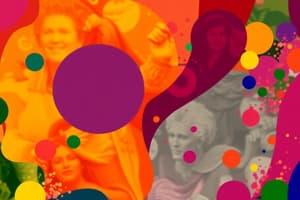Podcast
Questions and Answers
What concept describes heritage that is constantly evolving and transcending cultural boundaries?
What concept describes heritage that is constantly evolving and transcending cultural boundaries?
- Static Heritage
- Global Heritage
- Cultural Heritage
- Nomadic Heritage (correct)
Planetary heritage advocates for the division of cultures into 'their heritage' and 'our heritage'.
Planetary heritage advocates for the division of cultures into 'their heritage' and 'our heritage'.
False (B)
Match the following terms with their descriptions:
Match the following terms with their descriptions:
Digital Repatriation = Ethical return of digital heritage to its source culture Planetary Heritage = Shared heritage beyond cultural divisions Cultural Nomadism = Heritage in motion, adapting to changes Technological Oppression = Exclusion caused by lack of access to technology
The integration of local knowledge and cultural protocols enhances the positive aspects of digital heritage.
The integration of local knowledge and cultural protocols enhances the positive aspects of digital heritage.
What is a potential negative outcome of technological advancements in heritage representation?
What is a potential negative outcome of technological advancements in heritage representation?
Digital archaeology entirely avoids the politics and ethics associated with heritage studies.
Digital archaeology entirely avoids the politics and ethics associated with heritage studies.
What is the significance of the copy of the Syrian Arch of Triumph in the context of digital heritage?
What is the significance of the copy of the Syrian Arch of Triumph in the context of digital heritage?
Who is primarily responsible for producing digital heritage?
Who is primarily responsible for producing digital heritage?
A replica lacks the authenticity of being __________.
A replica lacks the authenticity of being __________.
Why do replicas tend to be viewed negatively by the public?
Why do replicas tend to be viewed negatively by the public?
What is one reason why digitization is considered valuable for heritage?
What is one reason why digitization is considered valuable for heritage?
How does the paper characterize the relationship between contemporary colonial technocracy and heritage politics?
How does the paper characterize the relationship between contemporary colonial technocracy and heritage politics?
What is one of the main benefits of using digital technology in archaeology?
What is one of the main benefits of using digital technology in archaeology?
Which term refers to new forms of archaeology that utilize digital methods?
Which term refers to new forms of archaeology that utilize digital methods?
What concern is raised regarding the digitization of cultural heritage?
What concern is raised regarding the digitization of cultural heritage?
Study Notes
Ontological and Epistemological Status of Digital Heritage
- Digital heritage's ontological status is ambiguous, existing as a hybrid between the "real" and the digital "other."
- It embodies cultural nomadism, constantly evolving with social change and technological advancements.
- This "nomadic heritage" transcends global categories and can be considered "planetary," representing shared heritage beyond cultural boundaries.
- The concept of "planetary heritage" emphasizes a mindset where there's no separation between cultures, promoting shared ownership.
- For digital heritage to be truly valuable, it must be produced through reflexive engagement with local knowledge, subaltern agency, and cultural protocols.
- Otherwise, it risks becoming a tool of technological oppression or imperialism, particularly if access to technology is unequal.
Perceptions and Challenges of Digital Copies
- Digital replicas, such as copies of the Syrian Arch, are often perceived negatively, lacking the authenticity and "pastness" of originals.
- They are seen as sanitized and lacking the "aura" associated with original artifacts, which emphasizes uniqueness and age.
- Observers might find these copies aesthetically displeasing, too large or too small or view them simply as lacking authenticity.
- This negative perception reinforces the dominance of Western concepts of heritage which prioritize originality over replication.
Transformative Value and Agency of Digital Heritage
- The act of creating a digital replica is a transformative process in itself – a form of active value and meaning-making.
- Digitization can enhance the value of the "real" object, increasing its social, historical, and aesthetic importance.
- The resources involved in generating 3D renderings and enabling widespread distribution contribute to this value.
Digital Heritage: Politics, Ethics, and Ownership
- Digital archaeology sometimes avoids the political and ethical complexities of heritage studies.
- Key questions concerning digital heritage are: What is it? What is its political role? What is its cultural and spatial setting? Who produces it? For whom is it intended? Who owns it?
- The case of the replicated Syrian Arch highlights the complexities of ownership and the implications of such reproductions.
- Post-colonial theory provides a valuable framework for understanding the power dynamics and ethical considerations surrounding digital heritage, acknowledging issues of neo-colonial influence.
- Digital heritage can be seen as an embodiment of hybridity, reflecting contemporary nomadism in the production and movement of digital representations across political spaces.
Planetary Heritage
- Advocating for a shared planetary heritage transcends cultural boundaries and emphasizes the interconnectedness of all cultures
- The concept focuses on the evolution and integration of heritage beyond individual cultural spheres.
Digital Heritage
- Digital heritage involves the integration of local knowledge and cultural protocols into the digital representation of heritage
- It aims to understand the complex dynamics between technology and cultural heritage through digital representations
- The integration of local knowledge and cultural protocols can enhance the positive aspects of digital heritage by preserving cultural values and ensuring inclusivity.
- Digital archaeology, despite its potential, still raises important ethical and political considerations, similar to traditional archaeology
- The research question in digital heritage focuses on the impact of technological advancements on the documentation, preservation, and access to cultural heritage.
- Technological advancements can lead to the homogenization of cultural heritage representations, potentially erasing unique cultural nuances
- Digital heritage often reflects the influence of colonial technocracy on architecture, highlighting the power dynamics involved in the representation of cultural heritage.
- The Syrian Arch of Triumph copy serves as a case study for understanding the complex relationship between original and replica in digital heritage representations
- The production of digital heritage is primarily driven by the collaboration of different stakeholders, including institutions, researchers, and local communities.
- Digital heritage is not solely aimed at local audiences, but rather seeks to expand access to global audiences.
Replicas and Heritage
- Replicas are viewed negatively by the public due to their perceived lack of authenticity and the potential for misrepresentation of the original cultural object
- The concept of pastness emphasizes the significance of the original object's historical context and the tangible connection to the past
- Digitization plays a crucial role in ensuring the preservation and accessibility of cultural heritage, particularly for fragile and inaccessible objects.
- The combination of original and replica in heritage preservation creates a multifaceted understanding of the cultural object, allowing for both historical understanding and contemporary interpretation.
- The aura, as described by Walter Benjamin, refers to the unique qualities associated with the original, including its historical context, authenticity, and materiality
- Replicas are crucial for addressing the contemporary political and cultural issues surrounding heritage, promoting dialogue and understanding.
- The replica serves as a catalyst for critically examining the complexities of heritage representation, highlighting the roles of power, technology, and cultural context.
- Recognizing the ethical and ontological dimensions of heritage can lead to a more nuanced and inclusive understanding of the world.
Contemporary Colonial Technocracy and Heritage Politics
- Colonial technocracy is a term used to describe the influence of colonial power structures on the way technology is used to represent and manage cultural heritage.
- The paper emphasizes the political, ethical, and ontological dimensions of heritage politics, highlighting the need for critical engagement with the power structures that influence the production and representation of cultural heritage.
- Replicas play a crucial role in the power dynamics of heritage politics, serving as both a tool for preservation and control.
- The paper suggests that the replica can act as a bridge between past and present, prompting reflection and engagement with heritage as a contested site of memory and identity.
- Understanding the ethical and ontological dimensions of heritage politics is crucial for ensuring inclusivity, criticality, and social justice within the field of heritage studies.
Digital Technology in Archaeology
- Archaeology is increasingly using digital technology for preservation, especially in non-invasive interventions
- This shift is driven by the need to protect and preserve endangered heritage
- New forms of archaeology are emerging, including digital and cyber rescue archaeology
Ethical Concerns in Digital Archaeology
- Digitization raises important questions about the ethical and political implications of digital technologies in archaeology
- There is a need for deeper theoretical reflection and critical discussion within the field of digital heritage to address these concerns
- The ambiguous status of digital technologies in archaeology is identified as a key factor influencing their ethical implications
Studying That Suits You
Use AI to generate personalized quizzes and flashcards to suit your learning preferences.
Related Documents
Description
Explore the complex ontological and epistemological status of digital heritage. This quiz delves into the ideas of cultural nomadism, planetary heritage, and the implications of digital replicas on cultural perception and ownership. Test your understanding of how technology interacts with heritage and cultural protocols.




